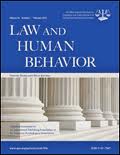 Undergraduate resident assistants’ reporting behaviors are determined by knowledge of university sexual assault reporting policy, trust in these support systems and perceptions of mandatory reporting. This is the bottom line of a recently published article in Law and Human Behavior. Below is a summary of the research and findings as well as a translation of this research into practice.
Undergraduate resident assistants’ reporting behaviors are determined by knowledge of university sexual assault reporting policy, trust in these support systems and perceptions of mandatory reporting. This is the bottom line of a recently published article in Law and Human Behavior. Below is a summary of the research and findings as well as a translation of this research into practice.

Featured Article | Law and Human Behavior | 2017, Vol. 41, No. 5, 429-439
The Evolving Landscape of Title IX: Predicting Mandatory Reporters’ Responses to Sexual Assault Disclosures
Authors
Kathryn J. Holland, University of Michigan
Lilia M. Cortina, University of Michigan
Abstract
Approximately 1 in 4 women is sexually assaulted in college, a problem that federal law has attempted to address with recent changes. Under the evolving landscape of Title IX, and related law, universities nationwide have overhauled their sexual assault policies, procedures, and resources. Many of the new policies designate undergraduate resident assistants (RAs) as Responsible Employees—requiring them to provide assistance and report to the university if a fellow student discloses sexual assault. We investigated factors that predict the likelihood of RAs enacting their policy mandate, that is, reporting sexual assault disclosures to university authorities and referring survivors to sexual assault resources. Based on data from 305 Responsible Employee RAs, we found that likelihood to report and refer varied, depending on RAs’ knowledge of reporting procedures and resources, trust in these supports, and perceptions of mandatory reporting policy. Understanding mandatory reporter behavior is crucial, because help-providers’ responses can have serious implications for the recovery of sexual assault survivors. Our findings elucidate some effects of changes in the interpretation and implementation of Title IX, with potential to inform the development of more theoretically and empirically informed policies.
Keywords
Sexual assault, resident assistant, mandatory reporting, Title IX, law
Summary of the Research
“Under the evolving landscape of federal law, universities nationwide have overhauled their sexual assault policies. Decisions made in these policy revisions have significant implications for employees and students. For instance, under many university policies, undergraduate resident assistants (RAs) are designated as “Responsible Employees” (a mandatory reporting role under Title IX) and required to provide assistance and report to the university if a student discloses sexual assault.” (p. 429)
“The purpose of the current study was to examine how policy decisions—specifically around required reporting of sexual assault disclosures—affect an important group of policy actors: Responsible Employee RAs. RAs play a central role in many of these revamped sexual assault response systems, but we know little about their relevant knowledge, attitudes, or behaviors. Making novel contributions to the literature, we investigate factors that predict the likelihood of RAs enacting their policy mandate, that is, reporting sexual assault disclosures to university authorities and referring survivors to sexual assault resources.” (p.429)
“RAs are in the position to play a significant role in students’ lives after a sexual assault, and their responses may have weighty implications for survivors’ well-being. For instance, survivors who receive positive support following a disclosure report better mental health. Yet, we know little about RAs’ understanding, perceptions, and responses to these policies. Some studies suggest that, across universities, RA training is increasingly including the topic of sexual assault. The [Office of Civil Rights; OCR] recommends that mandatory reporters receive training about their responsibilities under federal and intuitional policy (e.g., whom to report to when they learn of an incident that may constitute sexual assault).” (p. 430)
“Although the OCR has provided expectations regarding the training of Responsible Employees, there are (currently) no federal laws that require training or dictate best practices around the content, format, or extent of sexual assault training for undergraduate RAs and other Responsible Employees. Many schools fail to meet recommended education standards, and even if they do, the content and format of information about sexual assault policies may be confusing for both students and staff. In general, research suggests that RAs can be inconsistent in enforcing other university policies (e.g., underage drinking). Moreover, other support providers, such as legal and medical personnel, are not uniform in their responses to sexual assault disclosures.” (p. 430)
“[T]heoretical frameworks suggest that there may be a complex relationship between knowledge and attitudes in predicting RA responses. For instance, the Reasoned Action Approach theorizes that knowledge alone may be insufficient to increase someone’s intentions to act, and the inter-play between background factors (like knowledge) and attitudes may further predict behavioral intentions. Thus, it is essential to examine multiplicative effects: how does the combination of RAs’ knowledge of reporting procedures and resources, trust in these supports, and perceptions of their responsibilities as a mandatory reporter affect willingness to put survivors in contact with support systems? For example, an RA who has excellent knowledge of the reporting process, but has little trust in that system’s ability to care for survivors and believes that their mandatory reporting requirement is problematic, may be less likely to initiate these reporting procedures after a disclosure.” (p. 431)
Results
“Taken together, [the] findings demonstrate that RAs’ responses to sexual assault disclosures are not as simple as knowing they have to report and/or provide referrals. Instead, the complexity of RAs’ knowledge of university sexual assault reporting procedures and resources, trust in these support systems, and perceptions of their mandatory reporting responsibilities all play a key role. Understanding RAs intentions to report disclosures and refer survivors to resources is crucial because help-providers’ responses can have serious implications for survivors’ mental health and future help seeking. Providing tangible aid, such as explaining reporting procedures and providing resource referrals, can be an important source of support for survivors. RAs are in a unique position to provide this support—and are increasingly obligated to do so. The current study helps to shed light on factors that may influence these responses.” (p. 435)
Translating Research into Practice
“[These] results identify the need for policy changes at both the federal and institutional level. Currently, there are no explicit or uniform requirements for training Responsible Employees under federal law. In its Title IX guidance, the OCR stresses that university employees—especially those who are likely to receive reports of sexual assault, including RAs—should receive training that will allow them to know the procedures for reporting sexual assault and how to respond appropriately; however, this is guidance (not law) and leaves room for variability in institutional interpretation and implementation of these recommendations (e.g., training content and delivery).”
“Current and future policies should establish clear requirements for training Responsible Employees. These employees have a weighty role: they are responsible for bringing assault survivors in contact with campus support systems, which have the potential to strengthen or impede healing after an assault. For example, OCR has the power to provide more explicit technical guidance about what constitutes comprehensive training for mandatory reporters and advocate for progressive sexual as- sault response systems under Title IX. Additionally, new legislation—like the proposed Campus Accountability and Safety Act (CASA)—could include training requirements for mandatory reporters (in addition to employees who are involved in sexual assault grievance procedures, which was more explicitly addressed in this bill). The states of Massachusetts and Delaware have also proposed bills that would require comprehensive, trauma-informed, and survivor-centered training for all Responsible Employees.” (p. 436)
“Moreover, schools must systematically and empirically evaluate the effectiveness of these trainings. Universities are not required to evaluate their sexual assault education and training efforts, and many do not assess the efficacy of RA training in general… a survivor may not be emotionally ready to formally report her/his assault, but that student’s RA may be mandated to report it anyway. Policies that remove survivors’ agency in reporting decisions may be experienced as institutional betrayal for both the survivor and the employee. Consequently, universities should evaluate the impact of policy decisions on both policy actors and intended beneficiaries.” (p. 436)
Other Interesting Tidbits for Researchers and Clinicians
“RAs who additionally lack trust in their institutions’ sexual assault reporting procedures may be further discouraged from reporting disclosures. Their hesitancy to report is understand- able in these circumstances, as sexual assault survivors frequently experience further abuse and trauma when interacting with formal support systems. Lawmakers, administrators, and researchers should think critically about how mandatory reporting policies affect the campus community—including those members who are obligated to enforce them.” (p. 435)
“[…] this cross-sectional and correlational study did not allow us to draw causal conclusions about the relationships between variables. Although our study was an important first step in understanding RAs’ responses to sexual assault disclosures, future experimental and longitudinal research will be essential for identifying how RAs’ knowledge and attitudes influence their actual responses to disclosures. Moreover, it will be useful to conduct qualitative research to gain more in-depth and nuanced understandings of RAs’ knowledge and perceptions of university sexual assault policies and resources.” (p. 436)
Join the Discussion
As always, please join the discussion below if you have thoughts or comments to add!






















